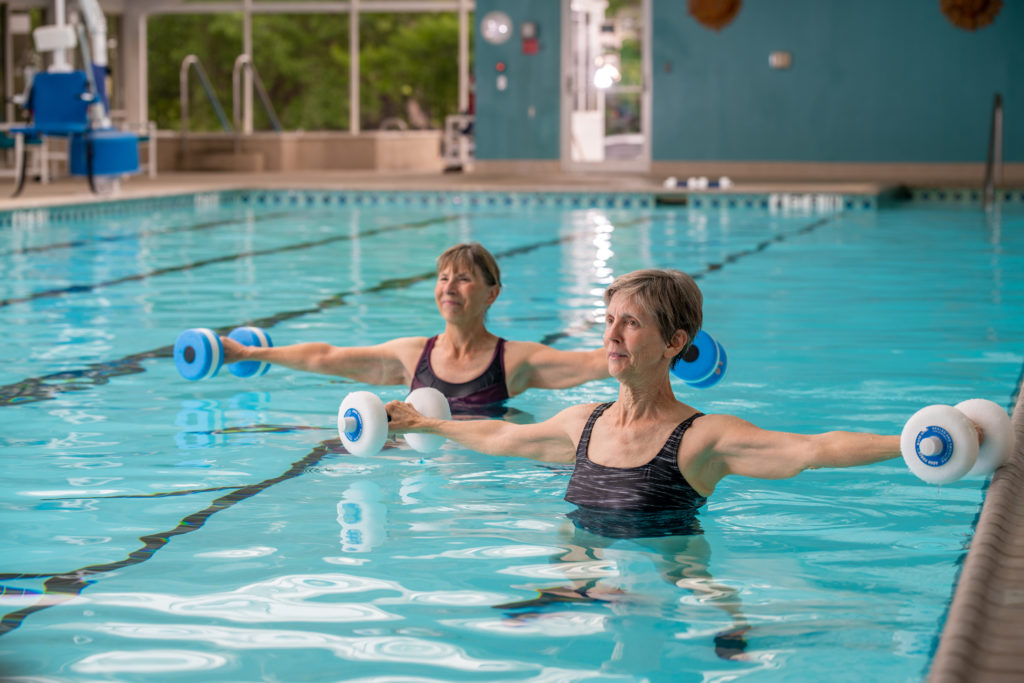
Setting intentions for a healthier and more peaceful year.
It’s the time of year for well-intentioned resolutions and phrases like “new year, new me” to start appearing in social media newsfeeds. Change is hard, but the good news is you don’t need to make major lifestyle alterations to feel your best.
Health and mobility play an important role in quality of life for older adults. Establishing wellness routines like eating nutritious food, being physically active daily, and practicing mindfulness can keep you healthy, energized and fit. With a focus on overall health, keep yourself inspired with these small victories that add up to a bigger payoff.
Balancing your diet
With so much advice on healthy eating, it can be hard to know what and who to trust. As with most things, the simpler, the better is how our diet should be. You can build a balanced diet by opting for more portions of nutrient-rich fruits and veggies and leaner cuts of meat. These simple changes can help reduce major health risks like diabetes, hypertension and heart disease. Adding more calcium-rich foods like Greek yogurt or seafood is great for bone strength, which is important for fall prevention. Using lighter fats and seasonings like olive oil instead of butter and more herbs instead of salt are other easy ways to cut calories without sacrificing flavor.
The USDA’s MyPlate Plan makes it easier for you to make better choices and plan a healthier diet. This handy computer widget is used on tablets, smartphones and laptops. By answering a few questions, the widget will create a personalized plan that includes all five groups on the food pyramid.
Stay hydrated
Did you know that your sense of thirst diminishes as you age? Staying hydrated is important for keeping electrolytes balanced and blood volumes normal. The brain functions better when you’ve had enough water, which is particularly important for seniors in warm weather climates. The current recommendation is to drink six to eight 8-ounce glasses of water per day. However, that varies based on age, gender and other factors. To stay on top of your daily water intake, find a reusable water bottle with measurement lines to keep track of your fluid intake throughout the day.
Get moving
Have you ever noticed how much better you feel after a workout? Exercise releases endorphins that improve self-esteem and promote a better attitude. All doctors agree there’s no better preventative measure for your health than exercise. If you’re new to working out, low-impact exercises are a great place to begin and can be especially beneficial for seniors with chronic joint, bone or connective tissue pain.
“We’re only as mobile as we are flexible,” Blue Skies of Texas fitness director Hope Santos says. She’s been the fitness director for more than 20 years and oversees more than 30 classes at the San Antonio retirement community, including strength training, Pilates, Tai chi and aquatic aerobics. All her classes are well-received, but the aquatics programs are typically the most popular.
Swimming and water aerobics are perfect examples of low-impact activities. In fact, they’re often called “no-impact” sports because water counteracts gravity and makes it easier for those with back or joint pain to enjoy exercise.
Walking is another gentle way to increase your heart rate and burn calories. A daily walk in the park or around your neighborhood can lower blood pressure and prevent osteoporosis.
Yoga, Pilates and strength classes are great for your health and excellent opportunities to make friends who encourage you to keep coming back week after week. Yoga aids in building core muscles essential for coordination and stability. Many senior workout classes feature seated and standing exercises and resistance band-based activities.
Practice mindfulness
If sweating isn’t your thing, consider other ways to lower stress and decrease anxiety. Mindfulness practices like meditation, journaling, hiking in nature, Tai chi and spirituality are soothing ways to pursue emotional well-being, live in the present and stay focused on being positive.
Expand your network
Loneliness is a growing concern for seniors, especially those dealing with the loss of a spouse. Socialization is important for all ages, and there are many physical and mental health benefits of social interaction for seniors. It’s been shown that retirees thrive better in social environments like Life Plan Communities. These offer opportunities to have exciting experiences and build connections with new people while remaining active and independent. Spending time exchanging stories and connecting with people is a big part of a well-lived life.
At Blue Skies of Texas, getting involved has never been easier. We offer more than 70 resident-run clubs, programs and activities. Many residents end up having busier schedules in retirement than during their career years. With book clubs, writing clubs, drama clubs, choirs and game leagues to stimulate conversation among peers, making new connections happens organically.
Never stop learning
Above all, continue to surprise yourself. Learning is part of the human experience. The more you challenge your brain, the sharper it will stay. Classes and continued lifelong learning courses are ways to stay part of stimulating conversations. Activities like solving crossword puzzles and Sudoku as well as reading books can also help ward off mental decline. Intellectual interests also contribute to your sense of purpose. Nurturing current hobbies and trying new ones keeps you from a sedentary life.
Self-improvement is all about consistency. Taking small steps each day in the right direction will surely create a positive change in your life. Whatever wellness means to you, the best way to achieve your goals this year is by investing in yourself and committing to a routine.
Find your routine at Blue Skies. We have myriad classes, programs and activities to help you meet new friends and feel good about yourself. Come see what life could be like for you. Call 866-553-5389 today to schedule your tour.


